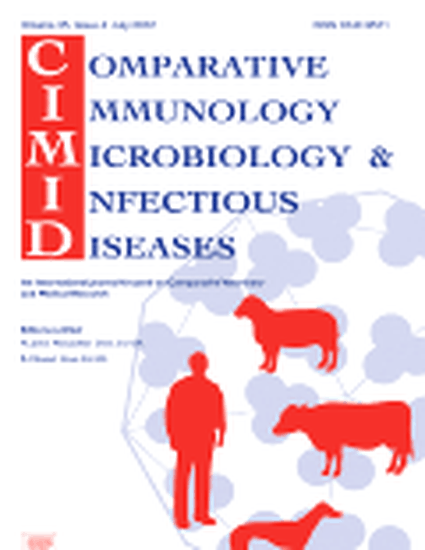
Article
Surveillance for multidrug resistant Escherichia coli carriage in cattle, dogs and humans reveals predominance of CMY-2, CTX-M-15 and CTX-M-9 groups of β-lactamases
Comparative immunology, microbiology and infectious diseases
(2022)
Abstract
Global spread of antimicrobial multidrug resistance (MDR) in human and veterinary medicine relies upon diagnostics, surveillance and stewardship to guide mitigation. Utilizing surveillance of fecal samples from our service area for detecting MDR Escherichia coli carriage in humans (2143), dogs (627), and cattle (130), we found isolates resistant to third/fourth generation cephems present in 3.7 %, 13.1 %, and 51.5 %, respectively. CMY-2, CTX-M-15-like and CTX-M9 group genes in descending order were predominant in all hosts and accounted for 83.3 % of non-wild-type gene targets. MDR carriage mirrored cephem non-susceptibility rates as published in annual antibiograms for humans and dogs; notably, no carbapenem-resistant carriage isolates were detected. Given the scale of MDR E. coli carriage in cattle (14X) and dogs (3.5X) compared to humans, bench-marking of the resistance gene pool by host species utilizing regional One Health surveillance may aid in assessing occupational and geographic risks for acquiring resistance and for monitoring of mitigation strategies.
Keywords
- AmpC,
- CRE,
- DNA microarray,
- E. coli,
- ESBL,
- One Health,
- Surveillance.
Disciplines
Publication Date
October, 2022
DOI
10.1016/j.cimid.2022.101880
Citation Information
Ortiz DA, Legenza LM, Olson BJ, Knapp CC, Killian SB, Meece JK, et al Surveillance for multidrug resistant Escherichia coli carriage in cattle, dogs and humans reveals predominance of CMY-2, CTX-M-15 and CTX-M-9 groups of β-lactamases. Comp Immunol Microbiol Infect Dis. 2022 Oct;89:101880. doi: 10.1016/j.cimid.2022.101880. PMID: 36116273.
